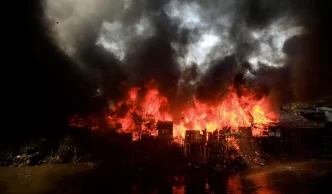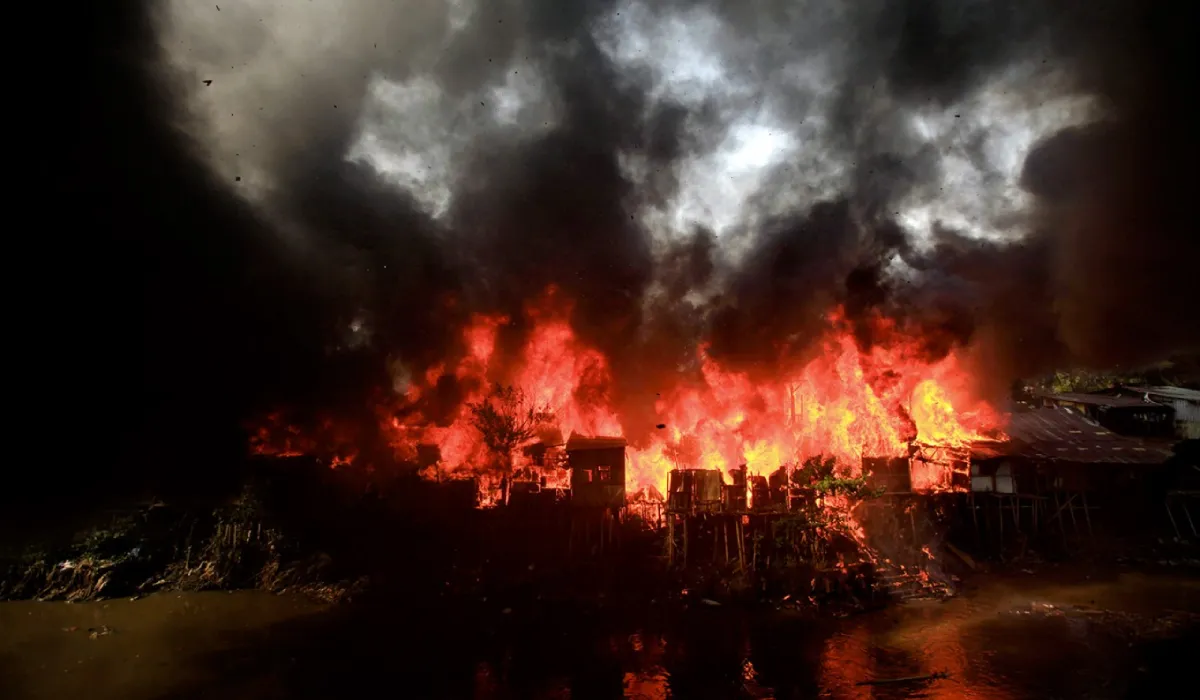Jakarta, Indonesia – Thousands of residents in Jakarta’s Kapuk Muara district are grappling with the aftermath of a devastating fire that razed their homes, leaving them in urgent need of safer, more permanent housing. The disaster, which displaced families and destroyed livelihoods, has exposed deep-seated issues in urban planning and disaster preparedness in one of Indonesia’s most densely populated areas. As local authorities scramble to provide temporary shelters, activists and community leaders are pressing for long-term solutions to prevent such tragedies from recurring.
Devastation in Kapuk Muara
The fire in Kapuk Muara, a low-income neighborhood in North Jakarta, tore through tightly packed homes, leaving over 5,000 people homeless. Many of the affected families are now housed in makeshift tents and temporary shelters, with limited access to clean water, sanitation, and basic amenities. Local reports indicate that the blaze, believed to have been caused by an electrical fault, spread rapidly due to the area’s substandard infrastructure and flammable building materials.
“We lost everything in a matter of hours” said Siti Aminah, a 42-year-old mother of three who has been living in a tent with her family since the incident. “We need a real home, not just promises. This is no way to live.” Her story echoes the frustration of many who feel abandoned by the slow pace of government response.
Jakarta’s administration has pledged to provide immediate relief, including food and emergency supplies, but the scale of the crisis has overwhelmed local resources. Governor Anies Baswedan announced plans to relocate some families to public housing units, though specifics on timelines and locations remain unclear. Critics argue that such measures are often temporary fixes that fail to address the root causes of urban vulnerability.
Urban Planning Failures Under Scrutiny
The Kapuk Muara fire has reignited debates over Jakarta’s urban planning policies, particularly in low-income areas where informal settlements are common. Experts point to overcrowding, lack of fire safety regulations, and inadequate infrastructure as key factors that exacerbate the impact of such disasters. Many homes in the district were constructed with cheap, flammable materials, and narrow alleys made it difficult for emergency services to access the area during the blaze.
“This tragedy was preventable” said Dr. Budi Santoso, an urban planning scholar at the University of Indonesia. “For years, we’ve seen authorities turn a blind eye to the conditions in these neighborhoods. Without stricter building codes and better zoning laws, we’ll see more of these disasters.”
The economic toll is equally staggering. Many residents of Kapuk Muara are informal workers who rely on daily wages from nearby markets and factories. The destruction of their homes has also wiped out small businesses, tools, and personal belongings, pushing families deeper into poverty. Estimates suggest that rebuilding efforts could cost upwards of 500 million Indonesian Rupiah (US$31,000), a figure that local budgets may struggle to meet without central government support.
Calls for Permanent Housing Solutions
Community advocates are urging the government to prioritize permanent housing over temporary shelters, emphasizing the need for safe, affordable options that can withstand natural and man-made disasters. Organizations like the Jakarta Urban Poor Network have proposed community-led rebuilding projects that incorporate fire-resistant materials and improved spatial planning. They also call for greater investment in public housing that integrates low-income families into the city’s broader development plans.
“Temporary shelters are not a solution” said Rina Wulandari, a spokesperson for the network. “These families deserve dignity and security. We need policies that treat them as citizens, not just victims.”
However, funding and land availability remain significant hurdles. Jakarta, already grappling with issues like flooding and land subsidence, has limited space for new housing projects. Some officials have floated the idea of relocating families to peri-urban areas outside the city, but such proposals have met resistance from residents who fear losing access to jobs and social networks in the capital.
Government Response and Political Implications
The handling of the Kapuk Muara crisis has put pressure on both local and national leaders to address systemic issues in Indonesia’s urban centers. With Jakarta serving as the country’s political and economic hub, failures in disaster response can quickly become a lightning rod for public discontent. Opposition politicians have criticized the ruling administration for what they describe as a lack of preparedness and slow bureaucratic processes.
President Joko Widodo, commonly known as Jokowi, has yet to comment directly on the Kapuk Muara fire, though his administration has allocated emergency funds for disaster relief across the country. Analysts suggest that the government’s response to this crisis could influence public perception ahead of upcoming regional elections, where urban development and social welfare are likely to be key issues.
Meanwhile, international aid organizations and neighboring countries have offered support, with some providing tents, medical supplies, and technical assistance for rebuilding efforts. While such aid is welcome, it also underscores the need for Indonesia to build resilience at home through better policies and infrastructure investment.
Broader Context of Urban Disasters in Indonesia
The Kapuk Muara fire is not an isolated incident but part of a broader pattern of urban disasters in Indonesia. From floods in Jakarta to earthquakes in Sulawesi, the country faces frequent challenges due to its geography, rapid urbanization, and uneven development. In recent years, fires in informal settlements have become increasingly common, often linked to electrical faults, cooking accidents, or arson—though no evidence suggests the latter in this case.
Data from the National Disaster Mitigation Agency (BNPB) shows that over 1,000 fire incidents were reported in Jakarta alone last year, displacing thousands and causing millions in damages. These figures highlight the urgent need for systemic change, particularly in how cities manage growth and protect vulnerable populations.
Environmental factors also play a role. Jakarta’s sinking land, exacerbated by groundwater extraction and climate change, complicates efforts to build safe housing in flood-prone areas like Kapuk Muara. Some urban planners advocate for a relocation of the capital—a plan already underway with the development of Nusantara in East Kalimantan—but such a move offers little immediate relief for those affected by disasters today.
Community Resilience Amid Uncertainty
Despite the challenges, stories of resilience are emerging from Kapuk Muara. Neighbors have banded together to share food and resources, while local volunteers are helping to clear debris and salvage what remains of personal belongings. Religious and community organizations have also stepped in, offering counseling and material support to traumatized families.
“We may have lost our homes, but we still have each other” said Muhammad Iqbal, a 29-year-old fisherman who is helping to organize aid distribution in his neighborhood. His words reflect a spirit of solidarity that has become a lifeline for many in the absence of swift government action.
Yet, as days turn into weeks, the patience of Kapuk Muara’s residents is wearing thin. Without concrete plans for relocation or rebuilding, fears are growing that temporary shelters could become permanent fixtures, further entrenching inequality in one of Asia’s largest metropolises.
Looking Ahead: A Test for Jakarta’s Future
As Jakarta wrestles with the fallout from the Kapuk Muara fire, the crisis serves as a stark reminder of the fragility of urban life for millions of Indonesians. The coming months will test the government’s ability to deliver on promises of safer housing and better disaster preparedness, while also shaping public trust in its leadership.
For the families of Kapuk Muara, the stakes could not be higher. Their struggle for a secure future is not just a local issue but a national call to action—one that demands innovative solutions, political will, and a commitment to ensuring that no citizen is left behind in the face of calamity.
As rebuilding efforts slowly take shape, questions linger about whether this disaster will mark a turning point for Jakarta’s urban poor, or simply become another chapter in a long history of neglect.
















